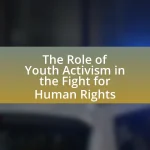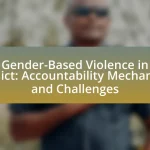The article focuses on the challenges faced in prosecuting war crimes, particularly in the context of recent conflicts such as those in Syria and Ukraine. Key issues include difficulties in gathering evidence due to chaotic environments, establishing jurisdiction across multiple countries, and ensuring witness protection. The article examines the types of evidence crucial for prosecutions, legal obstacles, and the influence of political factors on accountability. Case studies, including the Nuremberg Trials and the International Criminal Tribunal for the former Yugoslavia, illustrate the complexities involved and highlight lessons learned that can inform future prosecutions. Additionally, the article discusses strategies for improving the prosecution of war crimes through international cooperation and technological advancements.
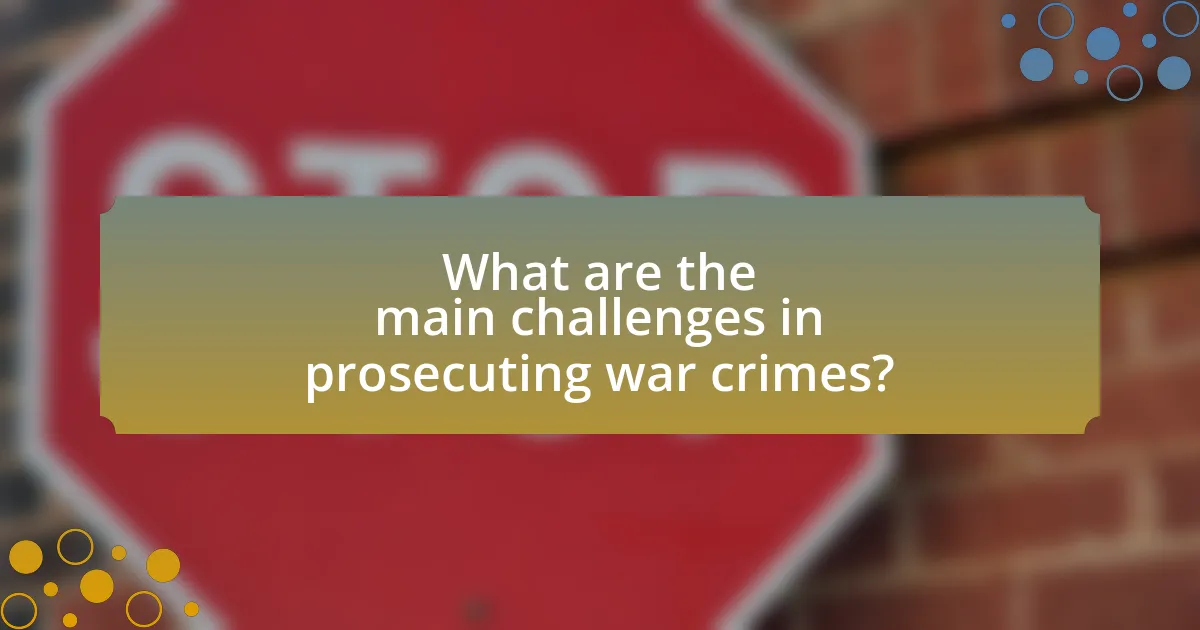
What are the main challenges in prosecuting war crimes?
The main challenges in prosecuting war crimes include gathering sufficient evidence, establishing jurisdiction, and ensuring the protection of witnesses. Gathering evidence is difficult due to the chaotic nature of conflict zones, where documentation and reliable testimonies may be scarce. Establishing jurisdiction poses legal hurdles, as war crimes can occur across multiple countries, complicating the application of international law. Additionally, the protection of witnesses is critical, as they may face threats or retaliation, which can deter individuals from coming forward. These challenges are evident in various case studies, such as the International Criminal Court’s difficulties in prosecuting individuals for crimes in Syria, where access to evidence and witnesses is severely limited.
Why is it difficult to gather evidence in war crime cases?
Gathering evidence in war crime cases is difficult due to the chaotic and dangerous environments in which these crimes occur. The ongoing conflict often leads to the destruction of physical evidence, such as documents and sites, making it challenging to establish a clear timeline and context of events. Additionally, witnesses may be traumatized, fearful of reprisals, or unable to access safe locations to provide testimony, which further complicates the collection of reliable accounts. Historical data indicates that in conflicts like the Syrian Civil War, over 500,000 people have been killed, and millions displaced, creating a vast landscape where evidence can be lost or compromised. Furthermore, the lack of cooperation from state actors and the complexities of international law hinder the ability to gather and preserve evidence effectively.
What types of evidence are crucial for war crime prosecutions?
Crucial types of evidence for war crime prosecutions include eyewitness testimonies, documentary evidence, physical evidence, and forensic evidence. Eyewitness testimonies provide firsthand accounts of the events, which can be critical in establishing the occurrence of war crimes. Documentary evidence, such as official military orders, communications, and reports, can demonstrate intent and planning behind the crimes. Physical evidence, including weapons, munitions, and remnants of attacks, helps to corroborate claims of specific incidents. Forensic evidence, such as DNA analysis and autopsy reports, can link individuals to crimes and establish the nature of the acts committed. These types of evidence are essential in building a comprehensive case that meets the legal standards required for prosecution in international courts.
How do conflict conditions hinder evidence collection?
Conflict conditions hinder evidence collection by creating an environment of chaos and instability that obstructs access to crime scenes and witnesses. In war zones, ongoing violence often leads to the destruction of physical evidence, such as documents and forensic materials, making it difficult to establish a clear narrative of events. Additionally, the fear of reprisals can deter witnesses from coming forward, resulting in a lack of testimonies that are crucial for building a case. For instance, during the Syrian civil war, many potential witnesses have been silenced due to threats from various factions, severely limiting the ability to gather reliable evidence. Furthermore, logistical challenges, such as damaged infrastructure and restricted movement, complicate the efforts of investigators to collect and preserve evidence in a timely manner.
What legal obstacles exist in war crime prosecutions?
Legal obstacles in war crime prosecutions include issues of jurisdiction, the principle of complementarity, lack of political will, and evidentiary challenges. Jurisdictional issues arise when determining which court has the authority to prosecute, as international law often requires states to have a connection to the crime. The principle of complementarity allows national courts to prosecute war crimes first, which can lead to impunity if states are unwilling or unable to act. Political will is often lacking, as powerful nations may shield their allies from prosecution. Additionally, evidentiary challenges, such as gathering reliable evidence in conflict zones and the protection of witnesses, complicate the prosecution process. These obstacles have been evident in cases like the International Criminal Court’s difficulties in prosecuting individuals from countries that do not recognize its authority, such as Sudan and Syria.
How do jurisdictional issues complicate prosecutions?
Jurisdictional issues complicate prosecutions by creating legal ambiguities regarding which court has the authority to hear a case. These complications arise when crimes occur across multiple jurisdictions, leading to disputes over applicable laws and the enforcement of legal processes. For instance, in war crimes cases, the International Criminal Court (ICC) may face challenges when a crime is committed in a country that is not a party to the Rome Statute, limiting its ability to prosecute. Additionally, national courts may be reluctant to assert jurisdiction over foreign nationals or events, further complicating accountability. This complexity is evident in cases like the prosecution of former leaders for genocide, where jurisdictional disputes can delay or prevent justice.
What role do international laws play in these challenges?
International laws play a crucial role in addressing the challenges of prosecuting war crimes by establishing legal frameworks that define offenses and outline accountability mechanisms. These laws, such as the Geneva Conventions and the Rome Statute of the International Criminal Court, provide a basis for prosecuting individuals responsible for war crimes, thereby promoting justice and deterring future violations. For instance, the International Criminal Court has jurisdiction over war crimes, allowing for prosecution when national courts are unwilling or unable to act. This legal structure is essential for ensuring that perpetrators are held accountable, as evidenced by the prosecution of individuals for war crimes in the former Yugoslavia and Rwanda, which reinforced the importance of international law in the pursuit of justice.
How do political factors influence war crime prosecutions?
Political factors significantly influence war crime prosecutions by affecting the willingness and ability of states and international bodies to pursue legal action. For instance, powerful nations may obstruct prosecutions to protect their allies or strategic interests, as seen in the United Nations Security Council, where veto power can prevent referrals to the International Criminal Court. Additionally, domestic political considerations, such as public opinion or electoral pressures, can lead governments to prioritize national interests over international justice, impacting the prosecution of war crimes. Historical examples include the reluctance of the U.S. to support the ICC due to concerns over sovereignty and potential repercussions for its military personnel.
What impact do state interests have on legal proceedings?
State interests significantly influence legal proceedings, particularly in the context of war crimes. These interests can shape the priorities of governments, affecting the prosecution of individuals accused of such crimes. For instance, states may prioritize political alliances or economic considerations over justice, leading to selective enforcement of laws or the protection of certain individuals from prosecution. Historical examples include the reluctance of countries to prosecute war criminals from allied nations, as seen in the aftermath of World War II, where geopolitical considerations often overshadowed the pursuit of justice. This dynamic illustrates how state interests can compromise the integrity of legal proceedings, ultimately impacting accountability for war crimes.
How does public opinion affect the prosecution of war crimes?
Public opinion significantly influences the prosecution of war crimes by shaping political will and judicial priorities. When the public expresses strong outrage over specific incidents, governments may feel pressured to pursue legal action against perpetrators to maintain legitimacy and public support. For example, the international response to the atrocities in the former Yugoslavia in the 1990s led to the establishment of the International Criminal Tribunal for the former Yugoslavia, driven by widespread public condemnation and advocacy from human rights organizations. This illustrates how collective sentiment can catalyze legal mechanisms aimed at accountability for war crimes.
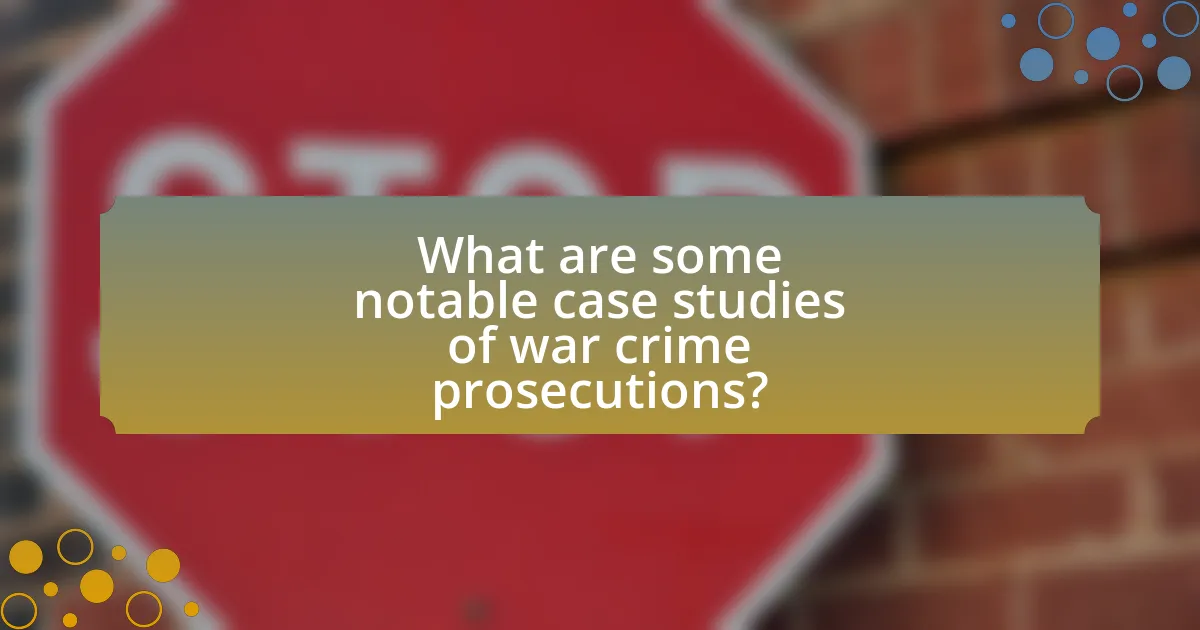
What are some notable case studies of war crime prosecutions?
Notable case studies of war crime prosecutions include the Nuremberg Trials, which prosecuted Nazi leaders for crimes against humanity after World War II, and the International Criminal Tribunal for the former Yugoslavia (ICTY), which addressed war crimes committed during the Balkan conflicts in the 1990s. The Nuremberg Trials established legal precedents for prosecuting war crimes, leading to convictions of key figures such as Hermann Göring. The ICTY resulted in significant rulings, including the conviction of former Bosnian Serb leader Radovan Karadžić for genocide and war crimes, highlighting the international community’s commitment to accountability. These cases demonstrate the complexities and challenges in prosecuting war crimes, including issues of jurisdiction, evidence collection, and political considerations.
What lessons can be learned from the Yugoslav War Tribunal?
The Yugoslav War Tribunal teaches several critical lessons about prosecuting war crimes, particularly the importance of international cooperation and the need for robust legal frameworks. The tribunal demonstrated that effective prosecution requires collaboration among nations, as evidenced by the involvement of multiple countries in apprehending fugitives like Ratko Mladić and Radovan Karadžić. Additionally, the tribunal highlighted the necessity of comprehensive legal standards to address complex issues such as command responsibility and the prosecution of sexual violence as a war crime, which were pivotal in cases like that of the Bosnian Serb military leaders. These lessons underscore the significance of establishing clear legal precedents and fostering international partnerships to enhance accountability in future conflicts.
How did the tribunal address evidence collection challenges?
The tribunal addressed evidence collection challenges by implementing a structured framework for gathering and preserving evidence, which included the use of advanced forensic techniques and collaboration with international agencies. This approach ensured that evidence was collected systematically, maintaining its integrity and admissibility in court. For instance, the tribunal utilized satellite imagery and digital forensics to corroborate witness testimonies, thereby enhancing the reliability of the evidence presented.
What were the outcomes of key cases in this tribunal?
The outcomes of key cases in this tribunal included convictions for war crimes, acquittals, and significant legal precedents that shaped future prosecutions. For instance, the tribunal convicted several high-ranking officials for crimes against humanity, establishing accountability for actions during conflicts. Additionally, some defendants were acquitted due to insufficient evidence, highlighting challenges in gathering reliable testimonies and documentation in war-torn regions. These outcomes not only provided justice for victims but also set important legal standards for prosecuting war crimes in subsequent cases.
What insights can be gained from the Rwandan Genocide trials?
The Rwandan Genocide trials provide critical insights into the complexities of prosecuting war crimes, particularly regarding the importance of international cooperation and the challenges of gathering evidence in post-conflict settings. These trials highlighted the necessity for a robust legal framework, as the International Criminal Tribunal for Rwanda (ICTR) established precedents in prosecuting genocide and crimes against humanity, leading to the conviction of key figures such as Jean-Paul Akayesu for inciting genocide. Furthermore, the trials underscored the significance of victim testimony and the role of local courts, known as Gacaca, in addressing justice and reconciliation, demonstrating that community-based approaches can complement formal judicial processes. The outcomes of these trials also revealed the difficulties in ensuring fair trials amidst political pressures and the need for ongoing support for victims and survivors in the aftermath of such atrocities.
How did the international community respond to these trials?
The international community responded to these trials with a mix of support and criticism, reflecting varying perspectives on justice and accountability. For instance, the establishment of international tribunals, such as the International Criminal Tribunal for the former Yugoslavia (ICTY) and the International Criminal Court (ICC), demonstrated a commitment to prosecuting war crimes. However, some nations expressed skepticism regarding the effectiveness and impartiality of these courts, citing concerns over political influence and the selective nature of prosecutions. Additionally, various human rights organizations advocated for stronger enforcement mechanisms and universal jurisdiction to ensure accountability for war crimes, highlighting the need for a cohesive international legal framework.
What were the successes and failures of the Rwandan trials?
The Rwandan trials, particularly the International Criminal Tribunal for Rwanda (ICTR), achieved significant successes in prosecuting key figures responsible for the 1994 genocide, including the conviction of high-ranking officials like Jean-Paul Akayesu, who was sentenced for genocide and crimes against humanity. These trials established important legal precedents in international law, particularly regarding the prosecution of sexual violence as a weapon of war.
However, the trials also faced notable failures, such as the limited number of cases prosecuted compared to the scale of the genocide, with only 93 individuals tried by the ICTR by its closure in 2015. Additionally, the trials were criticized for their lengthy proceedings and the challenges in gathering evidence, which hindered the pursuit of justice for many victims. The reliance on international courts also raised concerns about the lack of local involvement and the perceived disconnect from Rwandan society, which affected the overall impact of the trials on national reconciliation.
How do recent conflicts shape current war crime prosecutions?
Recent conflicts significantly influence current war crime prosecutions by establishing new legal precedents and highlighting the need for accountability. For instance, the Syrian civil war has prompted international bodies to adapt legal frameworks to address the complexities of non-state actors committing atrocities, as seen in the establishment of the International, Impartial and Independent Mechanism (IIIM) in 2016. This mechanism aims to collect evidence and prepare cases for prosecution, demonstrating how ongoing conflicts necessitate innovative approaches to justice. Additionally, the Ukraine conflict has led to increased scrutiny of war crimes, with the International Criminal Court (ICC) actively investigating alleged crimes, thereby reinforcing the importance of timely and effective legal responses to emerging conflicts. These examples illustrate how recent conflicts shape the landscape of war crime prosecutions by driving legal evolution and emphasizing the urgency of accountability.
What are the implications of the Syrian conflict on legal frameworks?
The Syrian conflict has significantly impacted legal frameworks by highlighting the challenges of enforcing international humanitarian law and prosecuting war crimes. The conflict has led to widespread violations, including the use of chemical weapons and attacks on civilians, which have prompted calls for accountability. However, the lack of a unified international response and the complexities of jurisdiction hinder the establishment of effective legal mechanisms. For instance, the United Nations has documented numerous war crimes, yet the Security Council’s inability to refer the situation to the International Criminal Court has left many perpetrators unpunished. This situation underscores the limitations of existing legal frameworks in addressing atrocities in ongoing conflicts.
How is the international community addressing war crimes in Ukraine?
The international community is addressing war crimes in Ukraine through investigations led by the International Criminal Court (ICC) and various national jurisdictions. The ICC has opened an investigation into alleged war crimes and crimes against humanity committed during the conflict, focusing on actions by both Russian and Ukrainian forces. Additionally, countries like Germany and Poland are pursuing legal actions based on universal jurisdiction, allowing them to prosecute individuals for serious crimes regardless of where they occurred. This multi-faceted approach aims to ensure accountability and justice for victims, supported by evidence collected from various sources, including satellite imagery and testimonies from survivors.
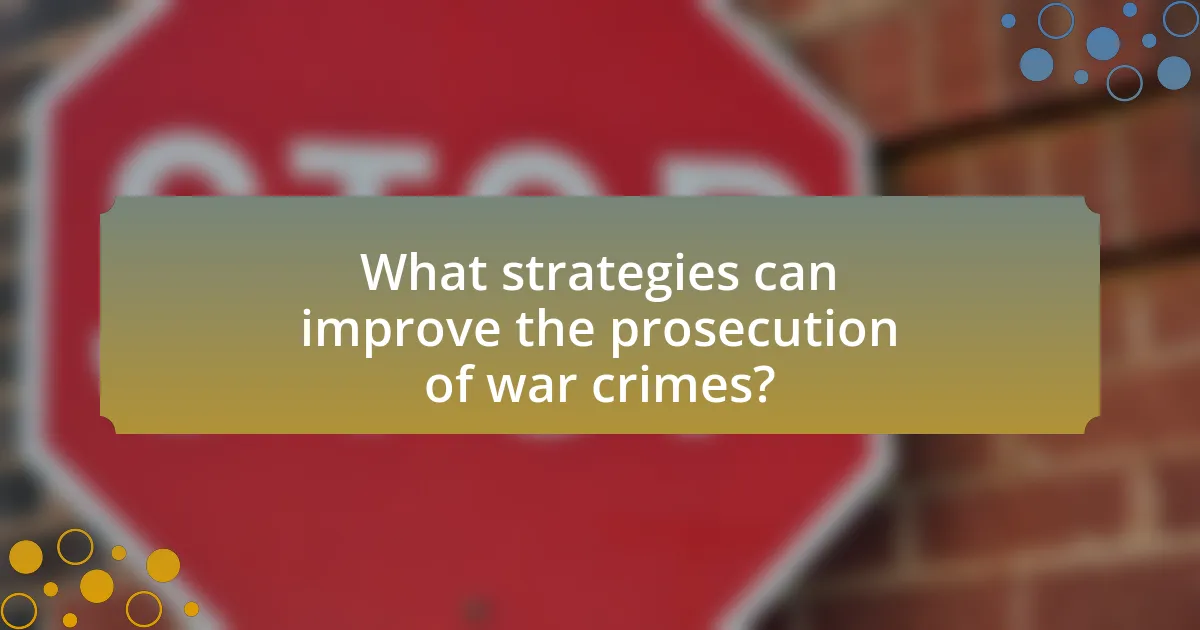
What strategies can improve the prosecution of war crimes?
Strengthening international cooperation and legal frameworks can significantly improve the prosecution of war crimes. Enhanced collaboration among nations facilitates the sharing of evidence and resources, which is crucial for building strong cases against perpetrators. For instance, the International Criminal Court (ICC) relies on member states to arrest suspects and provide evidence; thus, increased political will and commitment from countries can lead to more successful prosecutions. Additionally, implementing universal jurisdiction laws allows states to prosecute war crimes regardless of where they occurred, as seen in cases like the prosecution of former Chilean dictator Augusto Pinochet in Spain. Furthermore, investing in training for legal professionals and law enforcement on international humanitarian law ensures that they are equipped to handle complex war crimes cases effectively. These strategies collectively create a more robust legal environment for addressing war crimes.
How can international cooperation enhance war crime prosecutions?
International cooperation can enhance war crime prosecutions by facilitating the sharing of evidence, resources, and legal expertise among nations. This collaboration allows for the pooling of information from various jurisdictions, which is crucial in building comprehensive cases against perpetrators. For instance, the International Criminal Court (ICC) relies on member states to provide evidence and arrest suspects, demonstrating that effective cooperation can lead to successful prosecutions. Additionally, joint investigations and task forces, such as those established during the conflicts in the former Yugoslavia, have proven effective in gathering testimonies and forensic evidence, thereby strengthening the legal framework for holding individuals accountable for war crimes.
What role do NGOs play in supporting prosecutions?
NGOs play a crucial role in supporting prosecutions by providing evidence, legal expertise, and advocacy for victims of war crimes. They often conduct investigations, gather testimonies, and document human rights violations, which can be vital for building cases against perpetrators. For instance, organizations like Human Rights Watch and Amnesty International have contributed to successful prosecutions by compiling reports that serve as credible evidence in court. Additionally, NGOs frequently engage in lobbying efforts to influence legal frameworks and ensure accountability, thereby enhancing the overall effectiveness of the prosecution process in war crime cases.
How can countries collaborate to share evidence and resources?
Countries can collaborate to share evidence and resources by establishing international agreements and frameworks that facilitate information exchange. For instance, the International Criminal Court (ICC) provides a platform for member states to share evidence related to war crimes, enhancing collective efforts in prosecution. Additionally, countries can utilize joint task forces and collaborative investigations, as seen in the European Union’s efforts to combat human trafficking, which involve sharing intelligence and resources among member states. Such collaborations are supported by legal instruments like mutual legal assistance treaties (MLATs), which streamline the process of obtaining and sharing evidence across borders.
What best practices can be implemented for gathering evidence?
Best practices for gathering evidence in war crimes prosecution include thorough documentation, chain of custody maintenance, and the use of technology for evidence collection. Thorough documentation involves recording all relevant details, such as dates, locations, and witness accounts, which is essential for establishing context and credibility. Maintaining a chain of custody ensures that evidence is preserved and its integrity is protected, which is critical for legal proceedings. The use of technology, such as satellite imagery and forensic analysis, enhances the ability to collect and analyze evidence effectively. These practices are supported by the International Criminal Court’s guidelines, which emphasize the importance of reliable evidence in prosecuting war crimes.
How can technology aid in the documentation of war crimes?
Technology aids in the documentation of war crimes by providing tools for evidence collection, analysis, and dissemination. Digital platforms enable the capture of video and photographic evidence, while satellite imagery can verify the occurrence of attacks and the destruction of infrastructure. For instance, organizations like Human Rights Watch and the United Nations have utilized geospatial technology to corroborate reports of war crimes in conflict zones, allowing for precise mapping of incidents. Additionally, blockchain technology can ensure the integrity of evidence by creating immutable records, which is crucial for legal proceedings. These technological advancements enhance the accuracy and reliability of documentation, thereby supporting accountability efforts in prosecuting war crimes.
What training is necessary for legal professionals in this field?
Legal professionals in the field of prosecuting war crimes require specialized training in international law, human rights law, and the rules of evidence applicable in war crimes tribunals. This training typically includes obtaining a law degree followed by advanced studies or certifications in international criminal law, which equip them with the necessary knowledge to navigate complex legal frameworks such as the Rome Statute of the International Criminal Court. Additionally, practical experience through internships or clerkships with international tribunals or organizations like the United Nations enhances their understanding of procedural nuances and evidentiary standards specific to war crimes cases.
What are the future prospects for prosecuting war crimes?
The future prospects for prosecuting war crimes are increasingly promising due to the establishment of international legal frameworks and growing global awareness. Institutions like the International Criminal Court (ICC) and various hybrid tribunals have been created to hold perpetrators accountable, as evidenced by the successful prosecutions of leaders from the former Yugoslavia and Rwanda. Additionally, advancements in technology, such as digital evidence collection and forensic analysis, enhance the ability to gather and present evidence in war crimes cases. Furthermore, the increasing involvement of civil society and non-governmental organizations in documenting and advocating for justice contributes to a more robust prosecutorial environment. These factors collectively indicate a trend towards more effective prosecution of war crimes in the future.
How can reforms in international law impact future prosecutions?
Reforms in international law can significantly enhance the effectiveness and scope of future prosecutions by establishing clearer legal frameworks and improving enforcement mechanisms. For instance, the adoption of the Rome Statute in 1998, which established the International Criminal Court (ICC), has provided a more structured approach to prosecuting war crimes, genocide, and crimes against humanity. This reform has enabled the prosecution of individuals, rather than states, thereby holding leaders accountable for their actions during conflicts. Additionally, reforms that strengthen the definitions of war crimes and expand jurisdiction can lead to more comprehensive legal actions against perpetrators. Historical examples, such as the Nuremberg Trials, demonstrate that legal reforms can set precedents that influence future international legal standards and practices, thereby impacting the prosecution of war crimes in subsequent conflicts.
What role will public awareness play in advancing justice for war crimes?
Public awareness plays a crucial role in advancing justice for war crimes by mobilizing support for accountability and influencing political will. Increased public awareness can lead to greater pressure on governments and international bodies to take action against perpetrators, as seen in cases like the International Criminal Court’s prosecution of individuals involved in the Rwandan Genocide, where global outrage contributed to legal proceedings. Furthermore, public campaigns and media coverage can highlight injustices, ensuring that victims’ stories are heard and that there is a collective demand for justice, which can result in legislative changes and the allocation of resources for war crimes investigations.

